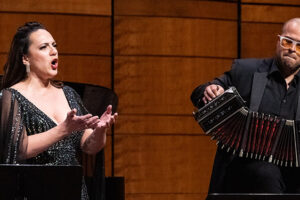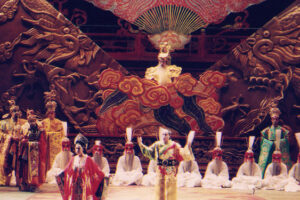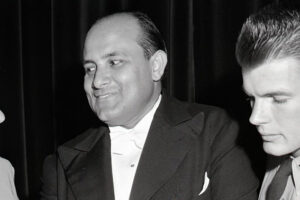

This all came about when, in August of 2001, I attended a performance of Ohio Light Opera’s then-new production of Carousel in Wooster, Ohio.
The musical, which I only knew through the rather listless and ineffective movie version, was, at the time, despite its beautiful music, not one of my favorites in the Rodgers and Hammerstein canon.
That all changed with the OLO staging and performances. Beautifully directed, sung, and acted, the production made me realize what a masterpiece this musical is. It was faithfully enacted the way the composer and librettist conceived it, and it wound up being one of the most devastatingly effective and emotional theater experiences of my life.
The last half hour, specifically, left me shaken, not stirred; it was so profoundly moving and heart-rending, that it left me in a fair state of shock at how I was made to reconsider the piece from my former, indifferent opinion of it.
Carouselhas similarities with French opéra comique and verismo: song interspersed with musical scoring during dialogue, with the fatalistic themes of spousal abuse and suicide. It is Rodgers and Hammerstein’s most operatic musical.
I became so enamored, natch, obsessed with the piece that I researched and wrote a lengthy, 20-page article for The Opera Quarterly.
The concluding section of the article dealt with all of the available recordings of the show. Going through some ten different recordings of almost wildly different approaches, with unbelievable liberties taken with the original score (odd keys utilized, some inappropriate voice-types, and an inconsistency of styles), one aspect was immediately apparent to me: that Raitt, the creator of Billy Bigelow, was the greatest exponent of the role of them all.
A colleague had put me in touch with an executive at the Rodgers and Hammerstein organization. I wanted to expand the scope of my article, and expressed a wish to do an interview with John Raitt. Wish granted: I was given Raitt’s phone number.
Residing in the Pacific Palisades with his third wife Rosemary, Mr. Raitt was an interviewer’s dream. Friendly, amiable, lucid, clear-thinking and enthusiastic, he made me feel immediately at ease. 84 at the time, he sounded 30 years younger.
From the end of 2001 to early into the next year, I had numerous conversations with Mr. Raitt. The formal interview for the article I conducted with him, via a nifty receiver that had a microcassette recorder, was the only portion of those conversations that got documented. How I wish I could have captured every last word that transpired.
We spoke for days, over the next few months, for hours! It was a completely surreal experience for me, speaking with this Broadway stalwart, whom I had grown up listening to in numerous recordings, whom I had seen in the movie The Pajama Gamewith Doris Day, who had the stature of a hallowed legend.
Mr. Raitt was so disarming, effusive and welcomingof my phone company, that I completely lost the star-struck fan mode within a short period of time. I at first kept asking him, “I don’t mean to keep you on the phone so long,” but he insisted, repeatedly, “No, no! I am really enjoying this!”
His was an incredibly vast, encyclopedic knowledge of singing and performing. We spent most of the time discussing vocal technique, and most especially diction—most specifically, singing in English. He was extremely vehement about intoning correct vowel values; he was genuinely perplexed at singers who allowed their vowels to migrate into indistinguishable sounds—and maintained that if you speak the vowels correctly, then you should be able to sing them likewise.
He sang several examples by way of demonstration, and I was thinking, reeling, “John Raitt is singing to me on the phone!”
I must say, I felt right in my element discussing the art of singing with him, and holding forth on an endless variety of topics related to musical theater history. He expressed at one point some surprise at my broad knowledge, telling me, “You know a helluva lot for someone so young.”
I recall a few amusing anecdotes as well. Mr. Raitt happened to be present with his friend Robert Merrill on one occasion in which he sang the “Star Spangled Banner.” Merrill related to Raitt that he was terrified that he would forget the words. He then took off his hat and showed Raitt: he had the words written and taped to the inside bottom of it.
I begged his indulgence at one point and asked him what it was like to work with Day in The Pajama Game. “Aww, what a wonderful gal she was! One of the most talented women I have ever worked with, and she didn’t even realize how good she was! Doris was a bit nervous about fitting in with the Broadway company, because she was the only one who wasn’t part of it on the stage. But she just amazed and won everyone over.”
In the meantime, I wrote my Carouselarticle, completed it, along with the interview with Mr. Raitt. I was eagerly anticipating the publication.
Then I received the bad news from my editor at The Opera Quarterly. The article itself would be published, but space would not allow the interview with Mr. Raitt to be included. Only a few lines from the interview would be utilized in context with the article.
I was crushed, and it was a supreme embarrassment, after all that time and effort I made to interview Mr. Raitt, to have to tell him the news. To my profound relief, he took it right in stride.
“That’s the way it goes,” he told me, “you can’t argue with an editorial decision.”
Still, I was mortified. And more than a bit angry. This was a chance to document a legend’s definitive statements on a role and piece that had entered the American musical theater realm. It was a grave disappointment.
When the article was published, I sent a copy off to Mr. Raitt. Again, to my relief, he called me to tell me how pleased he was to see my comprehensive overview, and my putting Carousel in its proper place. I promised him that I would some day, some way, find a way to get his interview published.
I never spoke to him again. When news came of his death in early 2005, I wept. My first reaction was, “Oh, Mr. Raitt. Thank you so much for blessing me with your art, and for giving so generously of your time.”
I couldn’t believe my good fortune to have been allowed the opportunity to get to know a great man, and artist. So kind, so generous of spirit. I think the overriding impression that I received was how thoroughly content he was with his legacy, his life, and how proud he was of his career. As for me, this experience somehow left me changed in a most affirmative way. There is something so exalted about being privy to the persona of a great artist, to be able to glean what it is that made them that way.
What we have left… the art.
One of the most surprising things Mr. Raitt told me was that he had been approached a number of times to become a Wagnerian heldentenor. He steadfastly refused, because it meant learning German and re-studying his voice; but the firm reason was that he preferred to be in American musical theater.
Once that information sunk in, I realized why Mr. Raitt had been asked to be a heldentenor. He had that rare middle of the voice strength and baritonal timbre, with a tenor’s upper extension. It was not until much later on, when I heard Jess Thomas, in his series of Wagner recordings, that I realized why Raitt could have been an outstanding heldentenor.
I still remember the first time I heard him on the original cast recording of Carousel. My appreciation reached further heights when I got done surveying the entire body of the various recordings for The Opera Quarterly.
Out of all the Billy Bigelows on record, Raitt’s struck me as being the most flawlessly sung. Gordon MacRaecame closest, but Raitt’s rendition of “If I Loved You” is simply an ideal piece of singing: legato, tone spun on the breath, and most crucially, the pronunciation and diction, the clarity and purity of the vowels, not a diphthong in sight—remains a non-pareil instance of how to sing American English:
How fortunate that his classic rendition of “Soliloquy” was captured in a 1952 telecast. Here is where Raitt sings the piece a half-step higher than the score, and ends with a powerful, free B flat that would be the envy of any tenor; let alone baritones:
30 years later, Raitt still had it:
Here is an enticing, and rare instance of Raitt singing opera, Figaro’s aria, in English, from The Barber of Seville. Raitt is simply delightful here, and he has the right, delicious swagger the piece calls for, and… behold the clarity of his diction, the way the words effortlessly trip off the tone:
Here is Raitt in his only major film appearance, as Sid Sorokin, in The Pajama Game, doing his classic rendition of “Hey, There.” Hear how beautiful his soft singing is in the upper register. Raitt’s strong performance and presence in the film medium inspires strong regret that Hollywood failed to take advantage of his merits in musical film:
An outstanding “Without A Song” (barring the backing cheesy choir):
Gaylord Ravenal’s music suited Raitt particularly well, as evidenced by “You Are Love,” in duet with Barbara Cook:
These are but a few samplings of Raitt’s art. YouTube has an excellent selection to choose from, but probably the most valuable documentation is the extended “If I Loved You” sequence from the mid 1950s, in which he is reunited with his Julie Jordan, Jan Clayton:
Tomorrow, I’ll present my interview with Mr. Raitt for the first time.
























Comments